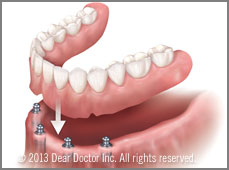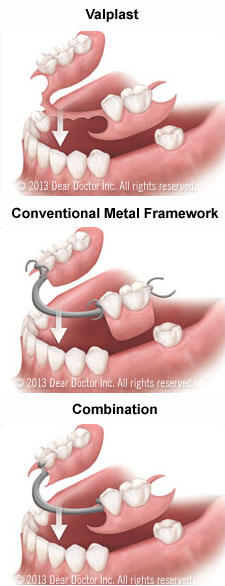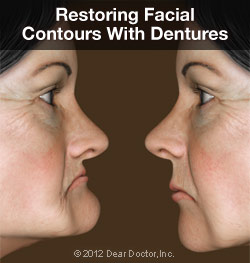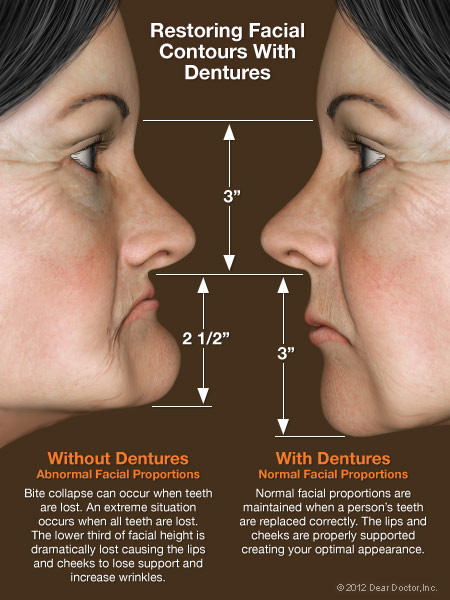Dentures & Partials

If you’ve lost some or all of your teeth, it’s important to replace them. Our teeth support the mouth, cheeks and jaw. Even if just one tooth is lost, your appearance can drastically change as the surrounding teeth drift out of position and change the bite. This can lead to bite problems, cavities, and periodontal disease.
If you’re missing several teeth, your jaw line loses shape, your lips flatten, your chin protrudes, and wrinkles increase. Fortunately, dentures can help correct these problems. There are several types of dentures available, from partial dentures to complete dentures to implant-supported dentures. Call us today for a consultation so we can explain the available options and determine which is best for you.
Types of Full Dentures
Deluxe Denture (Economy)
- Our economy dentures offer limited customization
- The size, shape and look of the teeth are based on your needs
- Less resistant to staining and breakage
- 1-year warranty
- Covered by most insurance
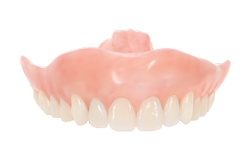
Elite Denture (Better)
Features
- High impact acrylic (HyPro or similar)
- Dentsply classic denture teeth
- Naturally festooned and stippled (if desired)
- Palatal relief (if needed)
- Characterizations and ethnic acrylic colors
Benefits
- Proven superior impact strength
- Mimic the natural oral formations
- Natural appearance
- 3-year warranty
- Insurance copay plus additional fee applies
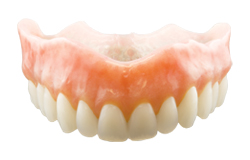
Premium Denture (Best)
Features
- High impact acrylic (Lucitone 199 or Similar)
- IPN denture teeth or Bioblend, etc.
- Naturally festooned and stippled (if desired)
- Palatal relief (if needed)
- Characterizations and ethnic acrylic colors
Benefits
- Best quality materials ranked highest in natural appearance
- High-density teeth with a variety of shapes and shades for a highly customized smile
- Thinner and stronger base with higher impact strength
- Years of proven reliability
- Appearance that mimics your natural oral formations
- Comfort for hard bony palate area
- 7-year warranty
- Insurance copay plus additional fee applies
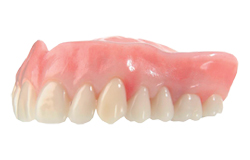
Immediate Dentures
These temporary dentures provide you with new teeth immediately after your natural teeth have been removed. However, dentures placed on the same day as the tooth extraction won’t fit as well as permanent dentures created once your mouth has healed. The permanent dentures account for the muscular readjustment required as well as the natural shrinkage of the gums.
Full or Complete Dentures
After your mouth has healed, we’ll create permanent dentures that conform to your mouth with near-perfect accuracy. These are carefully crafted to look as much like your own natural teeth as possible and will be able to function properly in your mouth for a long time.
Implant-Supported Overdentures
If you would like the most secure fit for your dentures, then consider anchoring them with dental implants. The upper jaw requires more implants (generally three or more) than the lower jaw due to the lesser bone density. Many people find this option offers a great balance of comfort, functionality and value.
Types of Partial Dentures
Transitional Partial Dentures
These relatively inexpensive removable plastic dentures serve as a temporary tooth replacement and space maintainer while you wait for your mouth to heal enough for a dental implant. Once the healing process is complete, the dental implant can be placed.
Removable Partial Dentures (RPDs)
Partial dentures can be made with a conventional metal framework, Valplast® plastic, or a combination. Partial dentures made with Valplast are the most aesthetic option. They feature high-quality replacement teeth and natural-looking cosmetic clasps, plus are thin, lightweight and flexible.
How Do Removable Dentures Work?
Complete and partial dentures consist of prosthetic teeth attached to a gum-colored acrylic or resin base. A complete denture replaces all the teeth on the top or bottom. A partial denture may be recommended when just some of the teeth are missing. Dentures help support the mouth, cheeks and jaw, restoring normal facial proportions and helping you maintain a younger appearance.
It’s important that your dentures are fitted properly. They are held in place primarily by the suctioning effect of their close fit against the alveolar ridges (gums). The upper denture also gets support from the large surface area of the roof of the mouth, which helps stabilize it. At first, it may seem strange to wear dentures to talk and eat. But over time, the muscles, nerves and ligaments of the mouth learn to work in new ways, which allows these functions to occur normally.
Denture Relining
Just like you did with your natural teeth, you need to care for your dentures to keep them looking and feeling great. Your dentist will give you tips on how to care for your dentures at home. Equally important is coming back in for regular dental visits so your dentist can adjust the fit and check the health of your mouth.
Over time, your gum line will change as the bone that once held your natural teeth in place begins to shrink. Your dentist will recommend your dentures be relined, or resurfaced, to adjust to the changes and keep the fit snug. Poorly-fitting dentures will feel uncomfortable and make it harder to eat and talk. They can also cause the bone and soft tissues in your mouth to erode more quickly. Relining your dentures minimizes these problems.
With proper care, dentures offer a functional, aesthetic and economical solution for people who have lost teeth.
Related Articles:

Removable Full Dentures
Complete tooth loss can cause a host of health problems, including malnutrition and bone loss. Though fixed bridgework may hold a higher place of reverence when it comes to replacing an entire set of teeth, removable full dentures can provide an elegant solution that is significantly more affordable...

Implant Overdentures for the Lower Jaw
Implant overdentures represent a major change for the dental profession and the public. The lower jaw two-implant overdenture may be considered a more appropriate starting point over regular dentures...
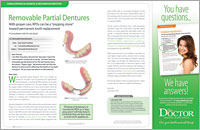
Removable Partial Dentures
When weighing options for replacing missing teeth, removable partial dentures are best thought of as transitional appliances. Still, a well-constructed, accurately fitting, thin metal-based removable partial denture can provide a wonderful aesthetic and functional service...

